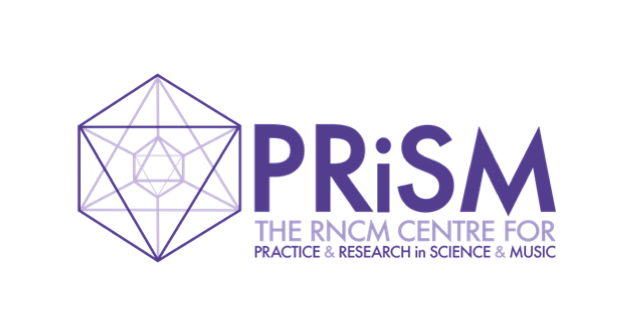2021 PRiSM Writers and Scientists in Residence
Welcome to the 2021 PRiSM Writers and Scientists in Residence
5 March 2021
We are delighted to welcome PRiSM Writers in Residence Abi Bliss and Leo Mercer, and PRiSM Scientists in Residence Rose Pritchard and Patrick Sanan. PRiSM brings together researchers and practitioners through establishing and nurturing creative collaborations across the sciences, music and beyond. We are really looking forward to working closely with Abi, Leo, Rose and Patrick, as their projects develop and evolve. I’m personally excited by how diverse these projects are and I’m particularly looking forward to group conversations; exploring, finding and creating links between them all. We’ll be sharing updates along the way. Professor Emily Howard, Director PRiSM

Abi Bliss, Leo Mercer, Rose Pritchard and Patrick Sanan (from left to right)
PRiSM Writer in Residence Abi Bliss | Critical Responses to Tomorrow’s Music
“As a journalist, I love meeting people who are immersed in a subject and learning from them in order to communicate their passion through my writing.”
Although composers have harnessed the potential of computers since soon after their invention, recent advances within machine learning – what is commonly known as ‘AI music’ – have opened up new collaborative relationships between humans and technology. Soon, everything from powerful new sound-shaping tools and previously unheard hybrid genres to pop stars making new records from beyond the grave will be possible. But what does this mean for us as listeners?
During my PRiSM residency, I will explore aesthetic and wider questions posed by AI music through extended research into the ideas and methods of those at the forefront of its creation. By discovering what music the PRiSM community are making – and why they are making it – I hope to provoke further reflection and debate and contribute to the creation of new critical responses for the AI age.
PRiSM Writer in Residence Leo Mercer | Cosmo Reads a Book in 2064 or, The Written Word in a Spatial Medium
“I work with composers and music producers to make drama out of current popular music, telling stories exploring post-internet life and the emotional and cultural impacts of new technology.”
Imagine it’s 1986, and someone puts an iPhone 12 into your hand. Someone explains that you can access any piece of writing on here. That pages connect with other pages by pressing words. That you can search through the entire catalogue instantly. That you can write instant letters to each other, having real-time written conversations. And you’ll use silly, bright images as natural parts of language. What do you say?
In my residency, I’ll be sharing research, interview transcripts and musings on this question as I go along, all with an eye to developing a VR prototype which you can see, either in a headset or an a web browser. What’s my end point? If I was making this prototype in 1986, and did well, it’d approximate an iPhone 12; if I do well in 2021, it’ll give a glimpse into what reading in 2064 might look like.
PRiSM Scientist in Residence Patrick Sanan | Adapt and Improve
“There is great potential for science and music to work together to create things which express the deep beauty of science and mathematics in a way that words cannot.”
Adaptive algorithms are a fascinating and almost-magical part of applied and computational mathematics. These algorithms and the data they generate could be of interest to composers, musicians and artists in that they can be of striking beauty. To watch complex structure emerge from perturbing a simple, symmetrical initial state can be deeply affecting.
This PRiSM residency project aims to provide a simple simulation software tool, suitable for composers and musicians to explore the possibilities of artistic use of these fascinating algorithms, either by direct interpretation or use of the simulations themselves, or as a compositional tool informed by the process of adaptive solution of a problem in fluid dynamics.
PRiSM Scientist in Residence Rose Pritchard | Music and Environmental Crises: Coping, Adaptation and Transformation
“My research is interdisciplinary and I draw on both ecological and social science research traditions in my work.”
My project will focus on how music shapes the ways people experience periods of crisis. There are rich literatures in development studies and social-ecological systems research on crisis resilience and on the systemic changes needed to prevent future crises. There are also strong bodies of research on music as therapy and music as driver of transformative social change. But these areas of research often do not intersect, and the creative arts are often neglected in ‘mainstream’ work on crisis coping and adaptation.
My goals for this project are to bring together researchers from different academic disciplines think about these challenges, to synthesise the current state of knowledge on music and complex crises and to co-develop an agenda for research going forward. Then explore the roles music has played in the lives of Manchester residents adapting to the COVID-19 pandemic. I will use interactive, participatory methods to understand how music can support (or undermine) wellbeing when people encounter a major large-scale shock.


